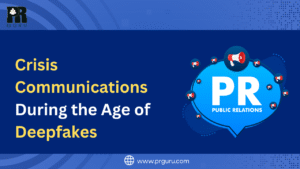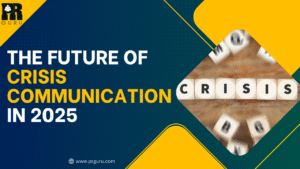PR Guru’s Ultimate Crisis Management Plan: Protect, Respond, Rebuild
Anticipating Crisis Situations: Identifying the Risks Before They Happen
By PR-Team | April 28, 2025 | Reputation Management

With the fast-paced world of the Internet today, a business’s reputation is one of its strongest assets. But with news delivered so quickly nowadays, a crisis, whether it is a PR nightmare, product defect, or social media storm, has the potential to spin out of control in just minutes. The secret that distinguishes the downfall of one brand from the success of another is the issue of crisis management.
A well-written crisis management plan is not just damage control—it’s saving your brand’s credibility, keeping customers in trust, and turning a negative into a positive growth opportunity. If your brand doesn’t have a solid crisis management plan, it’s time to create one.
Let’s dive into the most important steps to create a crisis-proof brand and be prepared for anything at any moment.
Anticipating Crisis Situations: Identifying the Risks Before They Happen
A crisis does not necessarily have to come with a warning sign, but that doesn’t mean that brands can’t be prepared for it. The most important thing for effective crisis management is recognizing the potential risks that can hurt your brand.

A company can suffer from a variety of crises, ranging from social networking site scandals where a poorly considered tweet infuriates the public, to product recalls due to safety or regulatory issues. Cyber-attacks, wherein customer details are hacked, can be catastrophically damaging to trust and engage legal interest. Scandal involving the staff or top-management scandals can draw adverse media coverage, whereas matters of law, such as lawsuits or regulatory violations, can destabilize a firm.
By recognizing these vulnerabilities, companies can create proactive response plans that enable them to respond quickly and authoritatively, limiting reputational and financial losses.
Establishing a Crisis Management Team: Who’s in Command When Disaster Strikes?
When disaster strikes, fast decision-making and open communication are paramount. This is why each brand requires a specific crisis management team to deal with the crisis effectively.

This team needs to include crisis communications specialists to craft the right message for different groups, lawyers to advise on legal matters, and PR specialists to handle media affairs. Social media planners may also be included in order to monitor public sentiment and prevent the dissemination of false information, while the senior leadership has to be brought in directly so that they can make high-level decisions and assume responsibility when required.
A good crisis management team doesn’t merely respond when crises occur—it holds regular crisis simulations, where all members understand their role and can deliver a coordinated response in a high-pressure situation.
Building a Crisis Communication Strategy: Telling the Right Story
Whether a brand is communicated during a crisis or not can either diffuse the crisis or propel it further. Crisis communication planning ensures that the brand is transparent, empathetic, and narrative leader.
The key principle of crisis communication is speed and openness. The longer a brand remains quiet, the more speculation there is and the worse things get. To make a prompt but cautious statement can prevent misinformation and signal that the brand takes the issue seriously.
Messaging should be factual, concise, and, if necessary, apologetic. Customers appreciate brands that take responsibility for something rather than attempting to deflect. A crisis statement should state the issue, provide relevant information, and describe the steps being taken to correct it.
Choosing the right platforms to communicate is also crucial. Social media is often where crises first emerge, so it is a key channel for live updates and customer engagement. Press releases are employed to keep journalists and industry experts credible, while website postings and email alerts ensure stakeholders and customers receive accurate information in a timely fashion.
An effective communication plan reassures the public, prevents panic, and allows the brand to regain control of the situation.
Monitoring Public Opinion: Keeping an Eye on the Online Conversation
In an era where public opinion can shift overnight, brands must stay on top of how audiences are reacting to the crisis. Monitoring public opinion in real-time allows businesses to get their messaging spot on and address concerns ahead of time.

Through the use of tools such as Google Alerts, social listening tools (Hootsuite, Brandwatch), and artificial intelligence-based sentiment analysis, brands can track conversations online and pick up on reputation threats. This helps determine whether the crisis response is effective or whether additional data is needed.
Being actively present in dialogue—whether by addressing customer complaints, dispelling false information, or showing appreciation for feedback—reflects transparency and a desire for resolution. Neglecting public opinion or diminishing a crisis only makes it more difficult to regain trust.
Implementing a Post-Crisis Recovery Plan: Restoring Trust and
Reputation

A crisis may pass, but its impact on a brand’s reputation could be permanent. That is why post-crisis recovery is as important as the initial response.
The first step towards recovery is evaluating the response strategy. Post-crisis analysis helps brands understand what went well, what did not, and how they can manage it better in the future.
To rebuild trust, there is serious engagement with customers and stakeholders. Brands have to be followed through on concrete solutions—whether it’s giving refunds after a product recall, changing company policies after an employee debacle, or implementing a CSR program to restore brand values.
A well-planned PR campaign can also turn the spotlight back to positive storytelling. It means talking to media outlets, influencers, and brand influencers to talk about company success stories and good practices, turning the story around and regaining consumer trust.
Well-handled, a crisis can be a catalyst for development, highlighting a brand’s resilience, accountability, and commitment to customers.
Why Crisis Management is More Important Than Ever
In this day and age of high-stakes online existence, crisis management is no longer a choice—it’s a necessity. A single bad incident, if not handled well, can result in irreversible loss of brand trust. However, with the right steps taken, brands are able to turn crises into opportunities to return stronger and more respected than they were before the crisis.
A good crisis management plan not only guarantees risks are reduced but also establishes the credibility of a brand, showing that it can overcome challenges with transparency, accountability, and professionalism.
We at PR Guru are crisis communication and reputation management specialists and help brands navigate difficult times with confidence. Whether proactive crisis planning, crisis response in the moment, or post-crisis recovery planning, we possess the expertise to safeguard your brand’s reputation.
Wait not for a crisis to happen—be prepared. Let PR Guru be your first point of call in building a resilient brand, whatever comes your way.
Visit us at PR Guru today to future-proof your brand.
Also Read: https://prguru.in/reputation-management/online-reputation-management-2/
Ready to take your PR strategy into 2025 and beyond? Visit PRGuru.in to find out how we can partner together to make your brand unforgettable.
Build authority, trust, and engagement with the right PR moves! Follow PR Guru on LinkedIn for expert tips, success stories, and industry trends








